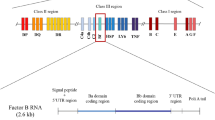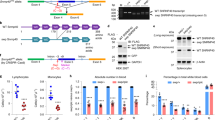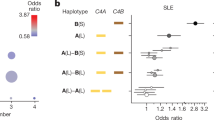Abstract
DEMANT et al.1 showed that the Ss-Slp region in the H–2 complex in mice affected the level of serum complement; the Ss high mouse having a higher complement activity than the Ss low mouse. They went on to show that antiserum to Ss protein could deplete complement activity from mouse serum, which has been confirmed in another laboratory2. This was the first association described between complement and the principal histocompatibility locus. Further associations have since come to light. In the mouse, C3 levels are controlled in part by a gene in the H–2 region3 although the effect is not large. On the other hand, the ‘C5 deficiency gene’ in the mouse is not linked to H–2 (ref. 4). In man the allotypes of factor B show close linkage to HLA (ref. 5). C2 deficiency in man is also HLA linked in family studies6 and a marked linkage disequilibrium has been observed between the ‘C2 deficiency gene’ and the haplotype HLA10,W18. In the family described with C4 deficiency, HLA linkage has also been described7. The C3 allotypes in man, however, are not linked to HLA, nor is the ‘C3 deficiency gene’8. For guinea pigs, the ‘C4 deficiency gene’ is linked to the principal histocompatibility locus9. Démant et al.1 showed that the Ss protein is likely to be a complement component, and in this communication we provide evidence that the Ss protein is the murine equivalent of the fourth component, C4.
This is a preview of subscription content, access via your institution
Access options
Subscribe to this journal
Receive 51 print issues and online access
$199.00 per year
only $3.90 per issue
Buy this article
- Purchase on Springer Link
- Instant access to full article PDF
Prices may be subject to local taxes which are calculated during checkout
Similar content being viewed by others
References
Démant, P., Capkova, J., Hinzova, E., and Voracova, B., Proc. natn. Acad. Sci. U.S.A., 70, 863–4 (1973).
Hansen, T. H., Shin, H. S., and Shreffler, D. C., J. exp. Med., 141, 1216–1220 (1975).
Ferreira, A., and Nussenzweig, V., J. exp. Med., 141, 513–517 (1975).
Herzenberg, L. A., Tachibana, D. K., Herzenberg, L. A., and Rosenberg, L. T., Genetics, 48, 711–715 (1963).
Allen, F. H., Jr, Vox Sang., 27, 382–384 (1974).
Fu, S. M., Kunkel, H. G., Brusman, H. P., Allen, F. H., Jr, and Fotino, M., J. exp. Med., 140, 1108–1111 (1974).
Rittner, C. L., Hauptmann, G., Grosse-Wilde, H., Grosshans, E., Tongio, M. M., and Mayer, S., in Histocompatibility Testing (edit. by Kissmeyer-Nielsen, F.) (Munksgaard, Copenhagen, in the press).
Vox Sang., 25, 9–20 (1973).
Shevach, E., Frank, M. M., and Green, F., J. Immun. (in the press).
Mardiney, M. R. R., and Muller-Eberhard, H. J., J. Immun., 94, 877–882 (1975).
Lachmann, P. J., Hobart, M. J., and Aston, W. P., in Handbook of Experimental Immunology, second ed. (edit. by Weir, D. M.), (Blackwell, Oxford, 1973).
Fearon, D. T., and Austen, K. F., Fedn Proc., 34, 981 (1975).
Author information
Authors and Affiliations
Rights and permissions
About this article
Cite this article
LACHMANN, P., GRENNAN, D., MARTIN, A. et al. Identification of Ss protein as murine C4. Nature 258, 242–243 (1975). https://doi.org/10.1038/258242a0
Received:
Accepted:
Issue Date:
DOI: https://doi.org/10.1038/258242a0
This article is cited by
-
Mouse sip: Female expression due to a dominant non-H-2 gene in wild mice
Immunogenetics (1982)
-
cis-Interacting genes in the S region of the murine major histocompatibility complex
Nature (1981)
-
Linkage of Pgm-3 in the house mouse and homologies of three phosphoglucomutase loci in mouse and man
Biochemical Genetics (1981)
-
Genetic polymorphism of serum complement components in the chimpanzee
Immunogenetics (1980)
-
The histocompatibility-2 system in wild mice
Immunogenetics (1980)
Comments
By submitting a comment you agree to abide by our Terms and Community Guidelines. If you find something abusive or that does not comply with our terms or guidelines please flag it as inappropriate.



